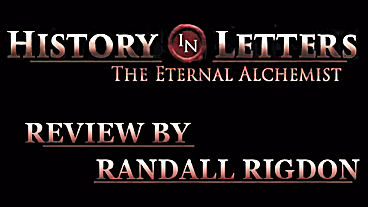
History in Letters – The Eternal Alchemist Review
What’s supposed to be a relaxing, casual affair for Broken Sword fanatics ends up being just the opposite



Genre: Casual/Adventure
Release date: December 8, 2015
I found myself excited to play History in Letters — The Eternal Alchemist based solely on the fact that it looked to be a blatant Broken Sword clone. As a major Broken Sword fan, any George Stobbart-inspired adventure game is sure to pique my interest, and History in Letters is no exception. Unfortunately, I was quick to find that History in Letters is less an adventure game and more casual game, albeit with a larger-than-usual narrative for such a title. Although I was able to to move past this fact, a large number of unusually strange technical issues hold the experience back from being fully playable.
It should be said that right off the bat, the narrative delivery is awkward. The dialogue is all unspoken and presented in large text blocks that the player must click through line for line. Aside each text box is a character model that would have been considered lifeless as far as two decades ago, and whose facial expressions are always over-the-top and unconvincing for every given reaction, quickly killing any sense of immersion.
Furthermore, there are lots of unnecessary ramblings between these characters that tend to take away from the narrative. For instance, a needed conversation with a priest — in order to get into a door behind him — ends up leading us through a substantially long dialogue about both characters’ personal beliefs on organized religion and the traumatic events that led them to these notions. Similarly, a simple conversation with a librarian begins to slide into explicit detail of an erotic novel before transitioning into an interrogation concerning her alcoholism, none of which of has anything to do with the task at hand.
While one could argue that these incessant ramblings are there for characterization, the dialogue doesn’t really flow or feel all that natural. And since there are no voiceovers to possibly add some sensibility to all the nonsense, it just ends up feeling like a chore having to click through each line of every endless monologue in what’s essentially just a casual game.
The reason I would categorize this as a casual game and not a full-fledged adventure is because the “puzzles” primarily consist of “find-the-object” screens and simplistic slider puzzles, all of which you’d expect of an edutainment title. The find-the-object screens are particularly perplexing as there are no time-limits (so essentially no challenge) and there are usually multiple duplicates of the object you’re looking for. If you click on one of the duplicates, Remy will state something along the lines of “no, the one I’m looking for is slightly different,” even though there’s no explanation why one cup out of twenty is any different then the rest.
Although the environments linking these puzzles have the appearance of a third-person adventure, the interactivity is more of a first-person adventure in that you simply click doorways from screen to screen. And herein lies the game’s most devastating facet: at every click of every screen there is always a phenomenally long loading screen. Even when clicking from one place to another in the same room, there still manages to be a two-to-five minute loading screen in between each click.
Never before have I played a game that managed to have such an extreme loading issue; I’m not even sure how you can have so many loading screens in one room. For instance, when you visit the church, you have to wait two-to-five minutes for it load. Then, if you want to explore the confessional at the side of the room, that’s another two-to-five minutes of loading. Then, if you want to go INTO the confessional to do some exploring, it’s another two-to-five minutes. Now repeat all of those in reverse once you’re done exploring the empty confessional.
I even left the game on for a minute while I went to grab myself a drink and my girlfriend came running to me convinced she had broken my game. She made a singular click on the screen trying to play it herself and was sure it had “frozen.” Sure enough, I came back to History in Letters and found it was stuck on yet another loading screen, which finally disappeared after another two minutes of waiting.
And while this issue seems more than enough to deem it already unplayable, another hiccup managed to be exceptionally worse. At one point, I had saved the game and quit out of it; when I went back to it and loaded my save game, every item in my inventory had disappeared. At this point the game was truly unplayable, and finding myself going back and trying to trod through the unbearable, frequent loading screens was endlessly frustrating. If one can manage to bear through all the hair-pulling technical downfalls, there are a relaxing couple of hours here of a Broken Sword derivative — complete with a self-boasting “dozen puzzles” here or there.
Unfortunately, what was supposed to be a relaxing, casual affair for Broken Sword fanatics ends up being just the opposite, as the endless loading screens, unsatisfying puzzles, absurd dialogue, and just overall game-breaking bugs which make the experience far from enjoyable. I will admit, when the game was doing what it was supposed to, the music was at least decently-relaxing — but even then, I’m pretty sure it’s from a stock library (my apologies to the composer if this is not the case). And while the story, at least, seems captivating enough, it still ends up feeling mostly second-rate. Needless to say, History in Letters is an exceptionally difficult game to recommend.
|
+ Relaxing music
+ Story is initially compelling
– Puzzles are remarkably easy
– Dialogue is a chore to click through
– I’ve never seen so many long loading screens
– Game-breaking bugs
|
 |
Processor: Single Core 2 Ghz
Memory: 2048 MB RAM
Graphics: Integrated Graphics
Processor: 2.4 GHz Intel Core 2 Duo processor
Graphics: NVIDIA GeForce 320M
Sound Card: Stereo Sound

Leave a Reply